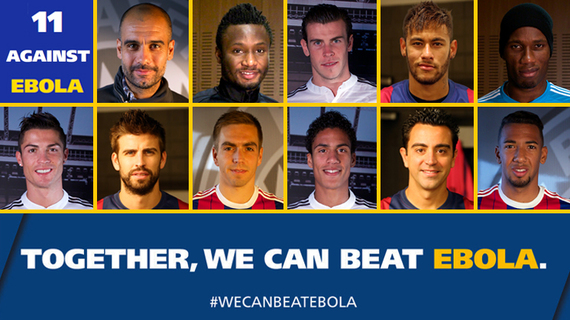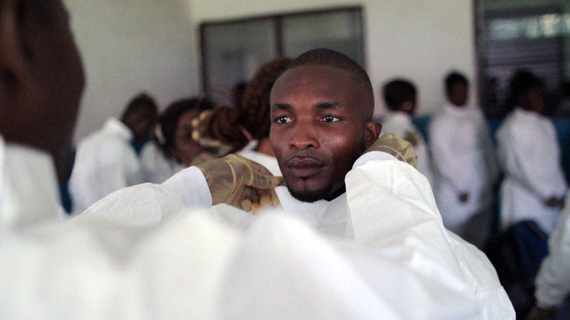© John James/UNICEF
Before becoming president of the World Bank, I was an infectious disease physician. I've seen firsthand that stopping an epidemic requires the coordinated efforts of many people and organizations. Ebola is no different. I'll be traveling today and tomorrow to Guinea, Liberia, and Sierra Leone, the three countries most affected by the Ebola outbreak. I'm interested in hearing from the heads of state in each country and from those on the frontlines of the response. The effort to fight Ebola has made some important progress in recent weeks, but our goal is to get to zero Ebola cases, and that will take another major push with new strategies and tactics. One important part of the next stage is stepping up awareness campaigns, and that's why the World Bank Group has partnered with 11 people who we hope will have a major impact on defeating the outbreak: some of the world's greatest football players. Our public awareness campaign is called 11 Against Ebola. These sports stars pass on messages about simple yet effective ways to reduce the virus's transmission and promote caring for the sick. Cristiano Ronaldo of Portugal tells people to "avoid body contact." George Davies of Sierra Leone encourages the sick to "seek immediate medical help." And Raphaël Varane of France warns, "Do not touch the dead."  Television spots, social media posts, online videos and posters are featuring team members telling audiences in Guinea, Liberia, and Sierra Leone how to respond to the outbreak. By empowering the affected populations with key information, these footballers will also help to reduce the fear associated with the virus and the stigma imposed on the sick. This effort is also a reminder that the rest of us must keep our eye on the ball: Ebola remains a global and local crisis, even as the international community increases its efforts to extinguish the outbreak. As of this week, the World Health Organization reported a global total of more than 16,000 cases and nearly 6,943 deaths. We also expect economic losses in the billions of dollars in the West Africa region, as employees stay home, markets close, and food prices rise. At the same time, we are seeing some hopeful signs. The numbers of cases in Liberia has decreased, and burial and funeral practices are becoming safer. This latter point is important because data suggest these improvements have had the greatest impact on reducing new infections. Indeed, now is the time to accelerate our efforts and adapt to changing conditions on the ground. We know this virus has a history of resurgence, so we need to hunt the virus where it still exists. We cannot accept anything less than zero new cases. To do this, teamwork is essential. We must implement disciplined contact tracing once someone is confirmed to have contracted the virus; continue to promote safe funeral and burial practices; provide a more flexible, decentralized treatment model of community-based care, with stronger ability to triage and diagnose; develop and distribute new diagnostics and vaccines; and listen to voices from the ground about how the response should adapt to changing conditions. Educating communities to reduce their transmission risk and seek medical attention early will play a critical role in the success of these plans. The 11 Against Ebola campaign helps accomplish this. We hope the messages from Didier Drogba of Côte d'Ivoire, Neymar Jr. of Brazil, Xavi of Spain, and others will spread throughout communities. We need teams like this to beat Ebola. Join the conversation on social media at #wecanbeatebola.
Television spots, social media posts, online videos and posters are featuring team members telling audiences in Guinea, Liberia, and Sierra Leone how to respond to the outbreak. By empowering the affected populations with key information, these footballers will also help to reduce the fear associated with the virus and the stigma imposed on the sick. This effort is also a reminder that the rest of us must keep our eye on the ball: Ebola remains a global and local crisis, even as the international community increases its efforts to extinguish the outbreak. As of this week, the World Health Organization reported a global total of more than 16,000 cases and nearly 6,943 deaths. We also expect economic losses in the billions of dollars in the West Africa region, as employees stay home, markets close, and food prices rise. At the same time, we are seeing some hopeful signs. The numbers of cases in Liberia has decreased, and burial and funeral practices are becoming safer. This latter point is important because data suggest these improvements have had the greatest impact on reducing new infections. Indeed, now is the time to accelerate our efforts and adapt to changing conditions on the ground. We know this virus has a history of resurgence, so we need to hunt the virus where it still exists. We cannot accept anything less than zero new cases. To do this, teamwork is essential. We must implement disciplined contact tracing once someone is confirmed to have contracted the virus; continue to promote safe funeral and burial practices; provide a more flexible, decentralized treatment model of community-based care, with stronger ability to triage and diagnose; develop and distribute new diagnostics and vaccines; and listen to voices from the ground about how the response should adapt to changing conditions. Educating communities to reduce their transmission risk and seek medical attention early will play a critical role in the success of these plans. The 11 Against Ebola campaign helps accomplish this. We hope the messages from Didier Drogba of Côte d'Ivoire, Neymar Jr. of Brazil, Xavi of Spain, and others will spread throughout communities. We need teams like this to beat Ebola. Join the conversation on social media at #wecanbeatebola.

